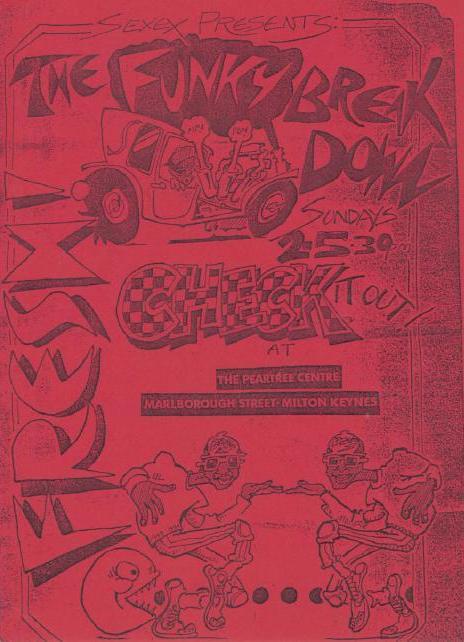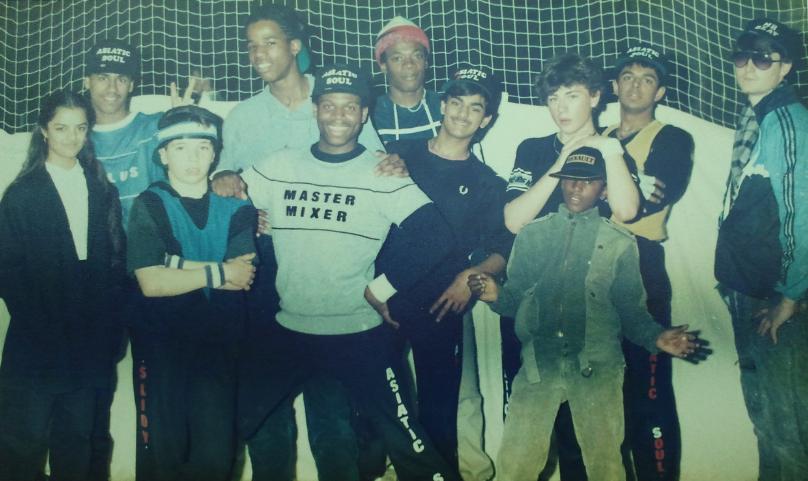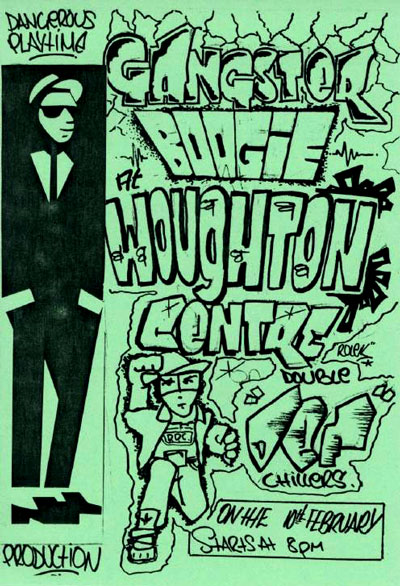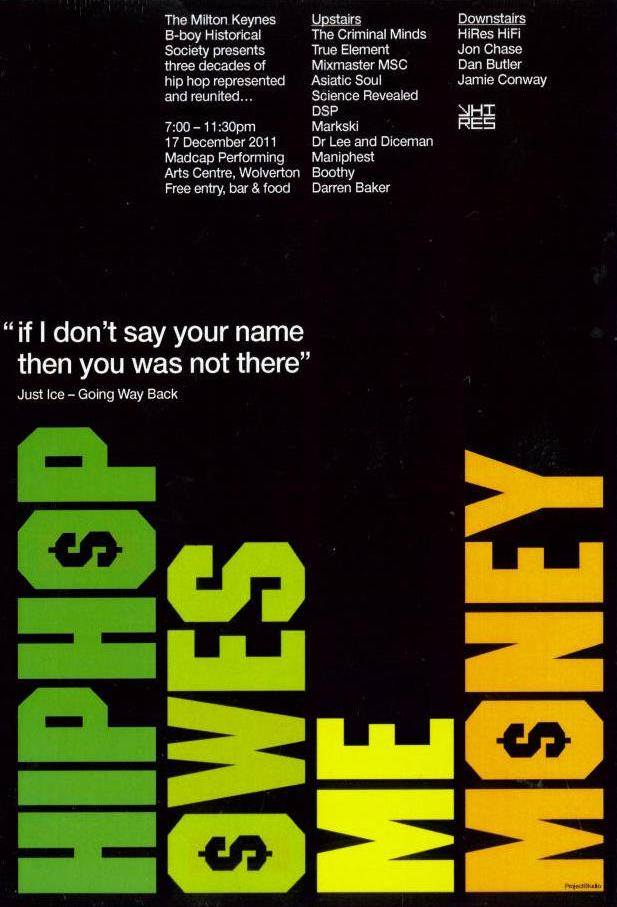Planned as a new City in the 1960s and developed through the 1970s Milton Keynes was designed to be a “City in the forest” between London and Birmingham. Residents of London began migrating to Milton Keynes in the late 1960s and continued through the 1970s and 1980s. By the mid 1980s the first wave of Hip Hop crews were taking to the streets and by the end of the decade Milton Keynes like many other Towns and Cities had its own fledgling Hip Hop scene that would develop and lead to a handful of local artists and crews taking their talent on to the streets and in to the clubs. Break to the beat recently had the opportunity of catching up with and interviewing one of Milton Keynes pioneering Hip Hop DJs Mixmaster MSC.
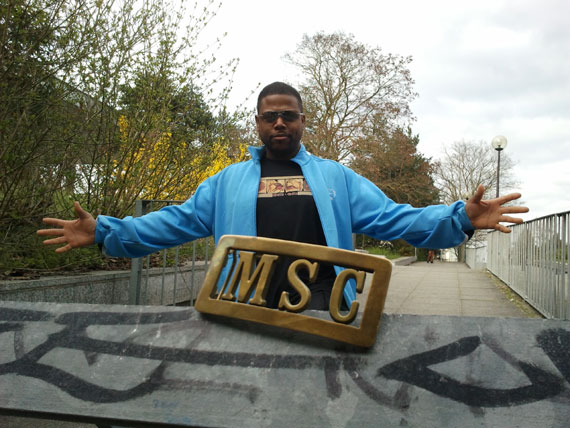
Mixmaster MSC – Milton Keynes, 2012.
Mixmaster MSC was one of the first Hip Hop scratch DJ’s to emerge from Milton Keynes. He was also a member of break-dance crew Asiatic Soul, and pioneering Hip Hop crew Double Deff Chillers. In the below interview Mixmaster MSC elaborates on the origins of Hip Hop culture in Milton Keynes and his involvement with the local scene.
Mixmaster MSC “Live performance” – The Point club, Milton Keynes, 1987.
You were one of the first DJ’s in Milton Keynes play Hip Hop music and embrace scratching. How did you get in to the hip hop culture?
Like most people at the time I saw the “Buffalo Gals” video by Malcolm McLaren and the Worlds Famous Supreme Team on the TV. I was amazed by the break dancing and the overall different sound of the music. “Buffalo Gals” was totally different to anything I had heard before and it was this record that got me in to the hip hop culture. My brother also knew a guy called “Noel Rose (aka reggae/dub artist Noel Zebulon)” who had lots of Hip Hop and Electro records. Noel used to copy them on cassette for my brother and I used to play the tapes over and over again and from there I was hooked. I just wanted to know how I could get my hands on this new music.
Malcolm McLaren & World’s Famous Supreme Team “Buffalo Gals” – Charisma, 1982.
What music were you listening to and influenced by before you heard Hip Hop?
My main influence before Hip Hop was Jazz Funk. When I was around the age of 13 my brother bought lots of instrumental Jazz Funk records and he used to play them in the house. I also used to listen to a Jazz Funk radio show on Sunday afternoons.
Could you give the readers any examples of the records that you and your brother were listening to?
A good example would be “The Smurf” by Tyrone Brunson.
Tyrone Brunson “The Smurf” – Epic,1982.
When did you start buying and collecting Hip Hop music and where did you buy your records?
I started to collect hip hop records in 1982 and at the time I would pick records up from anywhere I had access to. The first places I would buy records from was my local Boots and Woolworths stores but I soon discovered that to buy the imports I had to travel further afield as you could not find them in regular shops. One of the main places I used to go was to Groove Records in London.
Groove Records footage – London, Early 1980s.
What inspired you to get in to scratching and mixing records together?
I first saw my friend Farhan Sheik scratching a 7″ record back and forth in rhythm to the music he was playing while visiting his house. Around the same time I also noticed that some of the record covers I had in my collection had pictures of 2 Technics turntables and a GLI mixer on them. I put two and two together and realised that this is how DJs were manipulating the records so I saved and saved for months and months until finally I had enough money to purchase my own equipment.
What was your first DJ set up?
The first set up I had were 2 Garrards decks and a Tandy mixer that I learnt to scratch and mix on. Then several years later I upgraded my turntables to Technics SL1200s.
Where were the first places you played at?
The first place I started to play out was at the Woughton school disco which was held on Wednesday lunchtimes. I was attending Woughton School at the time and I had 2 friends that used to DJ there. The school used to have its oven equipment and I would ask the guys I knew to let me squeeze in and drop a few tracks during the lunch hour. The set up there was very limited and it was difficult to mix and scratch on the school equipment but it gave me my first opportunity to play to a crowd.
In terms of playing out on the local Hip Hop scene the first place I played at was an event called “The Funky Breakdown”. “The Funky Breakdown” was held in Peartree Bridge in Milton Keynes on Sunday afternoons. The year would have been 1984 or 1985. “The Funky Breakdown” was mostly a Hip Hop event but I used to mix in a bit of Soul music as well. That was more the style back then DJs would mix Hip Hop, Soul and Electro.
“The Funky Breakdown” event flyer – Peartree Bridge, Milton Keynes, 1984.
What other DJs do you remember playing at the Funky Breakdown?
The other DJs I remember playing at the time were Steve Gurley, Picci, and a DJ called Errol.
You were involved in one of the city’s first Breakdance Crews Asiatic Soul. How did Asiatic Soul form and what was your involvement in the crew?
Asiatic Soul was formed at Woughton school by Farhan Sheik who was the first break-dancer in Milton Keynes. There were a group of us who were all in to Hip Hop and Electro music and we got together with Farhan to form the crew. Ferhan was much more advanced at breaking that the rest of us but he showed us what he knew and we learnt from him. The other people in the crew were Kalpesh, Kamal, John Waden, Raymond, and Jesse (who later became known as pioneering graffiti writer Rolek). I was a DJ in the crew as well as a being a breaker.
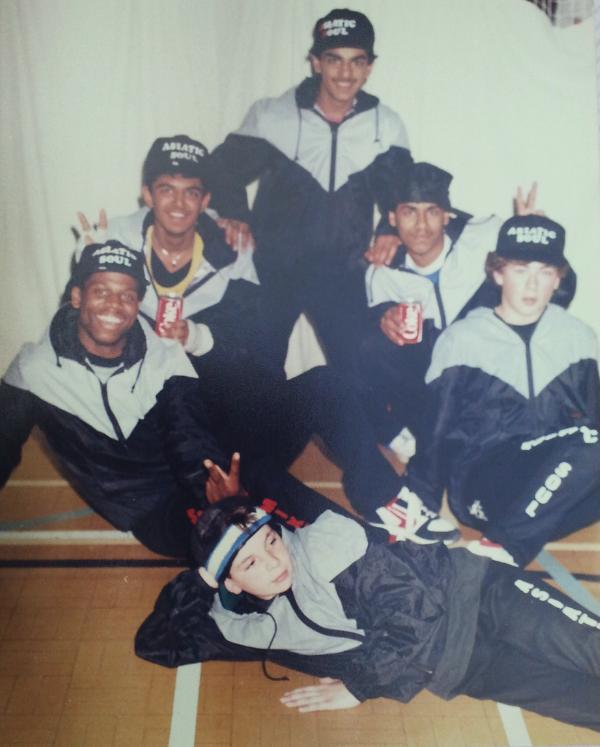
Asiatic Soul – Milton Keynes, 1980s.
Where did you guys used to break?
We used to break in Milton Keynes city center. I used to work in a supermarket there and we kept some lino under the stairs at the back of the supermarket. At lunchtimes we used to bring out the lino and everyone used to break. This would have been in what was known at the time as the City Square. City Square is now where Marks & Spencer’s has been built.
Asiatic Soul & Friends – Milton Keynes, 1980s.
Like many other DJs you progressed from playing music to making music how did you progress from being a live DJ to creating your own music?
The type of Hip Hop that was coming out in those early days was very sparse and there wasn’t that many elements involved in making the records. Some records were constructed using just drum machines, Turntables, Rapping, and sometimes beat box. In our crew we realised that we had myself who could mix and scratch, we also had a rapper who was already writing lyrics. All we really needed to get things started was the drum machine then we would have all the necessary equipment. So I went out an brought a TR808 drum machine and started to program my own beats. Then the rapper would drop his lyrics over the top and I would drop in scratches and cuts. This was the basis and our crew progressed from there.
Double Deff Chillers “Release the deff beat” – Demo recording 1986.
This eventually led to the formation of one of Milton Keynes first Hip Hop crews “Double Deff Chillers“. Can you break down how DDC formed and who was involved?
DDC eventually turned in to a 5 man crew consisting of DJ Mixmaster MSC, Rapper 2 Fresh (later know as MDR), Rapper/Beatboxer King Paul D, Producer G Whizz, & DJ Cutski.
The way we formed was initially with myself and rapper Martin Reilly. I’m not sure when Martin started rapping but he used to come round my house and we made our first demos using the TR808 drum machine and the set up as mentioned above. This would have been around 1983. Shortly after beatboxer/rapper Paul Delany joined us for the jam sessions which led to our first demos. The three of us continued to jam and make demos using the drum machine then in 1985 we met producer Gary Riches and DJ Mark Casey from Bletchley. Gary was producing beats using a sampler and was already working with DJ Cutski. The reason we formed DDC was to enter a competition that was happening at UK Fresh 86. Before the main event the organisers were running a competition were the winners would get the chance to perform at Fresh 86 as well as get the opportunity to record and release a record on the Street Sounds label. Street Sounds were releasing the Electro/Hip Hop compilation series at the time. The series were a far more accessible way to obtain some of the US imports that were being released all be it they were already mixed together.
UK TV News report on “UK Fresh 86” event – London, 1986.
How did you get on in the competition?
A London based crew called Family Quest went on to win the competition and released a record called “Sleepwalking”.
The Family Quest “Sleepwalking” Streetwave, 1986.
The Double Deff Chillers performed at several venues in Milton Keynes and one of the most high profile gigs was to play support to Hip Hop artists London Posse and Soul/R&B band Loose Ends. How did this opportunity arise?
DDC did quite a few gigs in Milton Keynes and we had started to build up a bit of a following on the local Hip Hop scene. Initially we would play in community centers and house party’s before playing some of the bigger venues like “The Woughton Center”.
“Gangster Boogie” event flyer – Woughton Center, Milton Keynes, 1988.
There was a new club opening in the point which was a brand new entertainment complex that contained the UKs first multiplex cinema and one of the promoters was putting on a Hip Hop and Soul night. They were looking for a local act to open up for London Posse and Loose Ends. Based on our reputation we were contacted by the promoter to perform at the event.
Double deff chillers “Live performance” – The Point club, Milton Keynes, 1987.
What is your view on the DJs roll in the Hip Hop Culture?
For me DJing was a personal thing, it was something you did with your own records and you mixed them together the way you wanted them to be mixed. My philosophy on the DJs role in hip hop is like being 3 different characters. A Conductor, a Surgeon, and a Violinist. Like a conductor in an orchestra the DJ is the person in charge of the music and as a DJ you have full control over everything that is coming out of the speakers. By playing sections of different records the DJ manipulates the music in a similar way to a conductor. A Violinist plays music by controlling the movement of a bow back and forth over the strings of the violin with their hand. When a DJ scratches a record they manipulate the vinyl against the needle back and forth in a similar way. Finally like a surgeon a DJ can use, cut, or mix any piece of any record that he has in his collection and manipulate or move it exactly how they want it in the set or in the track.
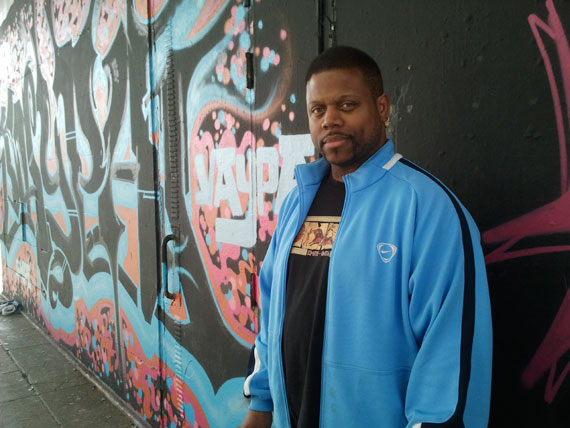
Mixmaster MSC – Milton Keynes, 2012.
Were you inspired by any other Hip Hop DJs? If so who were the biggest influences?
Yes I was inspired by other hip hop DJs I heard. The Main 3 who inspired me personally were Grandmixer DST, DJ Cheese, and DJ Jazzy Jeff. Grandmixer DST is most famous for his scratching on “Rocket” by Herbie Hancock. DJ Cheese was an incredible DJ with the crew “Word of mouth” and Jazzy Jeff was half of the crew Jazzy Jeff & The Fresh Prince. As most people know the Fresh Prince was Will Smith who is now an internationally recognised actor.
What about MCs? who were some of your favourites?
I really liked the Demon Boyz, Salt n Pepa, Monie Love, and The Cookie Crew.
Recently you performed at an event organised by the Milton Keynes B-Boy historical society called Hip Hop owes me money how did it feel to be back behind the wheels of steel again in your home city?
At first I felt nervous because I hadn’t played out for so long and I didn’t know the standard of DJs on the local scene. But as I got in to it I really enjoyed it. Afterwards some local b-boys came over and we had a chat about back in the days and some of them said that I was an inspiration for them to get in to Hip Hop which was cool.
“Hip Hop Owes Me Money” event flyer – Madcap theatre, Wolverton, 2011.
Break to the beat would like to thank Mixmaster MSC for breaking down some of MKs early Hip Hop history.
*special thanks to Martin Reilly for the knowledge, assistance and flyers.
For further information on Mixmaster MSC please see:
To keep up to date with Break to the beat news, projects and events please follow our social media pages.

